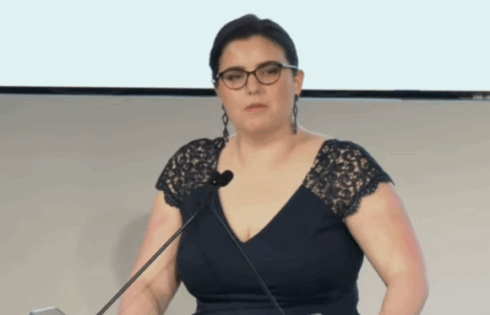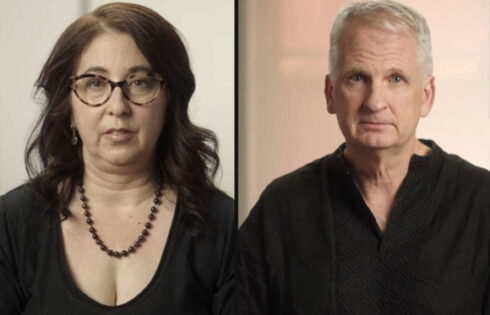
UPDATED
Laura Kipnis accused of libel, emotional distress, retaliation
They suggested she would get sued, and they were right.
Less than a month after Northwestern University philosophy students accused Prof. Laura Kipnis of breaking the law by writing a book on “sexual paranoia,” one of the philosophy students identified by pseudonym in Unwanted Advances has filed suit against her and publisher HarperCollins.
The same student filed a Title IX complaint against Kipnis for her Chronicle of Higher Education essay about sexual paranoia two years ago, which set the stage for Kipnis’s book about campus sex panics.
Both claim that Kipnis retaliated against rape victims by writing about the campus adjudication of sexual-assault claims against former Philosophy Prof. Peter Ludlow, first in her essay and now in her book.
According to the lawsuit, Kipnis’s description of the plaintiff – one of two students who accused Ludlow – was so revealing that she has been identified “within her academic and professional communities.”
The unnamed student said “prominent members of the academic philosophy community,” where she hopes to work, “have been dissecting” the Kipnis book on social media and professional blogs, “and publicly identifying Plaintiff by name.”
‘Young and promising’
The federal lawsuit, which is seeking at least $75,000 as well as punitive damages, makes similar points as those raised by the Philosophy Graduate Student Association in an April op-ed.
A majority of the association voted to publicly accuse Kipnis of violating the unnamed student’s privacy and not letting her comment on the book’s claims.
Identified as “Jane Doe” in the suit, the student says her “personal life and professional career prospects have been upended” by Unwanted Advances.
She was a “young and promising” 24-year-old prospective student in the “male-dominated” philosophy department when she met Ludlow, who became her professor, “mentor” and co-author on a paper that was never finished.
Doe was uneasy with Ludlow’s advances, but when he pressured her to have a “sexual relationship … she made a series of compromises in terms of allowing some physical intimacy,” according to the suit.
MORE: Kipnis broke the law with ‘sexual paranoia’ book, students claim
“It was clear” they had engaged in sexual intercourse when Doe woke up in naked in Ludlow’s bed, remembering nothing about the previous evening because “she became intoxicated.” It was “confusing and upsetting” to Doe that he forced physical intimacy when she only wanted emotional intimacy.
She failed every fourth-year goal in the program after taking an incomplete in a Ludlow course. The suit says 2017 “should be her final year” in Northwestern’s PhD program in philosophy.
The lawsuit takes pains to portray Doe as reluctant to accuse Ludlow even as Northwestern faculty and staff pressed her to do so. She only filed a complaint after hearing about allegations against Ludlow by other students.
Ludlow resigned in the middle of a termination proceeding for sexual harassment. He was cleared of sexual assault.
Lawsuit against Laura Kipnis by same student who filed Title IX complaint against her by The College Fix on Scribd
‘Out of context’ and ’embarrassing’ information
“In defending Ludlow and attempting to (falsely) reframe him as the victim of malicious female students and a Title IX process run amok, KIPNIS [sic] gratuitously discloses private and embarrassing details about the personal life of Plaintiff,” according to the suit.
Doe admits she brought a Title IX complaint against Kipnis on curious grounds – that the professor had “misrepresented” her Ludlow complaint in the Chronicle essay and suggested it “lacked merit.”
Retaliation is front and center in the lawsuit, however, with Doe saying Kipnis wanted revenge for Doe’s Title IX complaint.
 Unwanted Advances “needlessly devotes an entire chapter” to Doe, identifying her alleged sexual relationship with another professor and reprinting texts between Doe and Ludlow that are “out of context” and “misleading.” (Kipnis has previously cited those 2,000 texts and emails between Doe and Ludlow as the foundation for her assertions.)
Unwanted Advances “needlessly devotes an entire chapter” to Doe, identifying her alleged sexual relationship with another professor and reprinting texts between Doe and Ludlow that are “out of context” and “misleading.” (Kipnis has previously cited those 2,000 texts and emails between Doe and Ludlow as the foundation for her assertions.)
Ludlow had sued both Northwestern and the undergraduate student who had accused him of rape, and Doe acknowledges that Ludlow’s lawsuit – it’s not clear which – revealed “some bits and pieces” of her relationship with Ludlow.
MORE: Kipnis beats Title IX ‘inquisition’
But the Kipnis book revealed “embarrassing” information that had never been public, falsely portrayed Doe’s relationship with Ludlow as “consensual dating” and insinuated she’s a “manipulative liar” out for revenge against Ludlow.
By exaggerating the number of Title IX complaints Doe had filed – including a false claim that she targeted a fellow student – Kipnis branded Doe a “serial Title IX filer,” which is “the kiss of death” in academic philosophy, according to the suit.
Despite the pseudonym, “it was obvious to many who Kipnis was writing about,” Doe said.
My lawyer warned you already
Kipnis and HarperCollins did not “adequately investigate” Kipnis’s claims before publishing, not asking Doe whether the text messages between her and Ludlow were “authentic, complete, or presented in context,” the suit claims.
It said Kipnis withheld information that contradicted Ludlow’s claims because it did not fit her “narrative of Ludlow as victim,” and that the professor “continued to make false statements” in media interviews after being warned by Doe’s lawyer.
Most damaging, because Doe is easily identifiable in the small world of academic philosophy, her nascent career has been severely harmed:
Some in Plaintiff’s academic and professional community have opined online that, because of Unwanted Advances, Plaintiff will never get a job in her field. Others outright threaten to blacklist her. Indeed, because of the publication of Unwanted Advances and the firestorm of publicity and gossip that it has generated in her academic field, she has had to put off her entry into the academic job market by at least one and possibly two academic years.
The specific counts against Kipnis and her publisher are public disclosure of private facts, false light invasion of privacy, defamation and intentional infliction of emotional distress.
MORE: Prof accused of sexual assault sues student for defamation
Doe implies that Kipnis was not allowed to talk about the Ludlow case precisely because Doe had filed a Title IX complaint against her, which Northwestern ultimately dismissed:
Plaintiff had been through an awful experience, first with Ludlow, then with the entire Title IX debacle. The very fact that Plaintiff filed a Title IX complaint against Defendant LAURA KIPNIS [sic] in 2015, based on the harm Plaintiff experienced when KIPNIS [sic] first wrote publicly about Plaintiff in The Chronicle of Higher Education, was enough to put Defendants on notice that shining a spotlight on Plaintiff in this context had already and was continuing to harm her.
The student isn’t content to recoup compensatory and punitive damages and attorney’s fees from Kipnis and HarperCollins. She asked for “prejudgment interest,” which could mean Kipnis would have to pay interest on the eventual jury award going back to her original 2015 Chronicle essay.
The press release by Doe’s lawyers was flagged and shared on Facebook Tuesday, where it quickly drew derision.
“I have a feeling this isn’t going to go well for this graduate student,” said one commenter. “What could end up on trial here is Title IX,” said another.
One commenter said Doe’s privacy allegation is a “legal non starter” if the private information came from a party in the proceedings who was not under a confidentiality agreement.
Another noted Doe’s lawyers sued a school district this winter because a female student changed her mind about performing oral sex on a male student after she had started.
Kipnis told The Fix Wednesday she couldn’t comment. A spokesperson for HarperCollins said it doesn’t comment on pending litigation. The Authors Guild did not respond to an email.
UPDATE: Kipnis and HarperCollins responded to Fix inquiries Wednesday. The article has been amended accordingly.
MORE: Anti-rape activists ‘shut down’ Kipnis ahead of Wellesley talk
Like The College Fix on Facebook / Follow us on Twitter
IMAGE: Reason TV






Please join the conversation about our stories on Facebook, Twitter, Instagram, Reddit, MeWe, Rumble, Gab, Minds and Gettr.